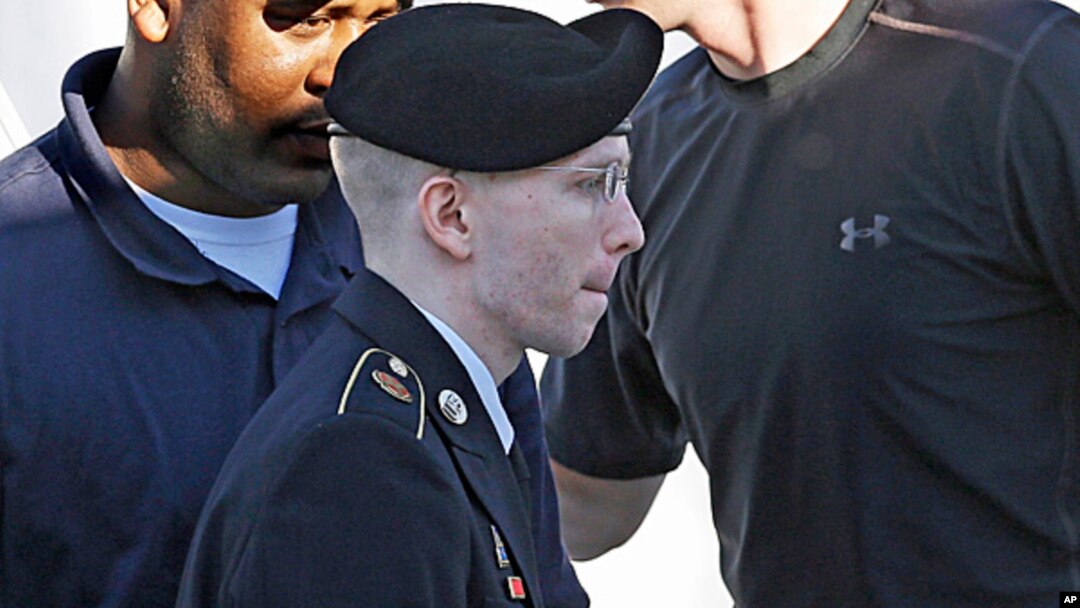FORT MEADE, MARYLAND —
The U.S. soldier accused of passing classified files to the WikiLeaks website boasted of his ability to crack passwords, one of his Army supervisors said at a court-martial on Wednesday.
The soldier, Private First Class Bradley Manning, 25, is charged with providing more than 700,000 documents to WikiLeaks, the biggest unauthorized release of classified files in U.S. history, in a case that has raised questions about the limits of secrecy and openness.
Manning, then an intelligence analyst, boasted of being able to bypass any Internet portal password, former Army Specialist Jihrleah Showman testified under prosecution questioning.
“He said he felt very fluent with computers. He said he spoke their language,” said Showman, who had been one of Manning's supervisors when he worked as an intelligence analyst at a U.S. Army base east of Baghdad in 2010. “He said there wasn't anything he couldn't do on a computer.”
Showman said Manning had installed Microsoft's IRC, or Internet Relay Chat, on her computer even though only a civilian contractor was allowed to do so.
Under questioning by defense attorney David Coombs, another supervisor, Chief Warrant Officer 2 Kyle Balonek, testified that the application was widely used in Iraq for Army internal communications.
Among the 21 charges Manning faces is adding unauthorized software to a computer that was part of the classified SIPR Network to download documents at a rate of a 1,000 an hour and bypassing security mechanisms.
Balonek said the base's SIPR Network hard drive included material that had been downloaded from other computers for safety, as well as music, videos and games that soldiers would use during quiet periods.
Balonek praised Manning's work in general, saying, “He did put together, I would say, excellent products.”
WikiLeaks, an anti-secrecy website, began exposing the U.S. government secrets in 2010, stunning diplomats and U.S. officials. They accused Manning of endangering lives and damaging sensitive diplomacy. Manning has been in confinement since he was arrested in May 2010.
In opening arguments of the trial, which began on Monday, prosecutors argued that Manning had been driven by arrogance. But lawyers for Manning portrayed him as naive but well intentioned in wanting to show the U.S. public the reality of war in Afghanistan and Iraq.
Manning could be sentenced to life in prison without parole if convicted. The charges include the most serious one of aiding the enemy and prosecution under the Espionage Act of 1917.
The trial is expected to run until at least late August.
The soldier, Private First Class Bradley Manning, 25, is charged with providing more than 700,000 documents to WikiLeaks, the biggest unauthorized release of classified files in U.S. history, in a case that has raised questions about the limits of secrecy and openness.
Manning, then an intelligence analyst, boasted of being able to bypass any Internet portal password, former Army Specialist Jihrleah Showman testified under prosecution questioning.
“He said he felt very fluent with computers. He said he spoke their language,” said Showman, who had been one of Manning's supervisors when he worked as an intelligence analyst at a U.S. Army base east of Baghdad in 2010. “He said there wasn't anything he couldn't do on a computer.”
Showman said Manning had installed Microsoft's IRC, or Internet Relay Chat, on her computer even though only a civilian contractor was allowed to do so.
Under questioning by defense attorney David Coombs, another supervisor, Chief Warrant Officer 2 Kyle Balonek, testified that the application was widely used in Iraq for Army internal communications.
Among the 21 charges Manning faces is adding unauthorized software to a computer that was part of the classified SIPR Network to download documents at a rate of a 1,000 an hour and bypassing security mechanisms.
Balonek said the base's SIPR Network hard drive included material that had been downloaded from other computers for safety, as well as music, videos and games that soldiers would use during quiet periods.
Balonek praised Manning's work in general, saying, “He did put together, I would say, excellent products.”
WikiLeaks, an anti-secrecy website, began exposing the U.S. government secrets in 2010, stunning diplomats and U.S. officials. They accused Manning of endangering lives and damaging sensitive diplomacy. Manning has been in confinement since he was arrested in May 2010.
In opening arguments of the trial, which began on Monday, prosecutors argued that Manning had been driven by arrogance. But lawyers for Manning portrayed him as naive but well intentioned in wanting to show the U.S. public the reality of war in Afghanistan and Iraq.
Manning could be sentenced to life in prison without parole if convicted. The charges include the most serious one of aiding the enemy and prosecution under the Espionage Act of 1917.
The trial is expected to run until at least late August.


